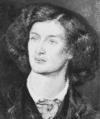- Swinburne, Algernon Charles
-
died April 10, 1909, Putney, LondonEnglish poet and critic.After attending Eton and the University of Oxford, Swinburne lived on an allowance from his father. His verse drama Atalanta in Calydon (1865) first showed his lyric powers. Poems and Ballads (1866), containing some of his best work, displays his paganism and masochism and provoked controversy; a second series (1878) was less hectic and sensual. His verse is marked by emphatic rhythms, much alliteration and internal rhyme, and lush subject matter. His health collapsed in 1879 and he spent his last 30 years under a friend's guardianship. His early poetry is noted for innovations in prosody, but his later poetry is considered less important. Among his outstanding critical writings are Essays and Studies (1875) and monographs on William Shakespeare (1880), Victor Hugo (1886), and Ben Jonson (1889).
 Algernon Charles Swinburne, watercolour by Dante Gabriel Rossetti, 1862; in the Fitzwilliam Museum, ...By courtesy of the Fitzwilliam Museum, Cambridge
Algernon Charles Swinburne, watercolour by Dante Gabriel Rossetti, 1862; in the Fitzwilliam Museum, ...By courtesy of the Fitzwilliam Museum, Cambridge* * *
▪ English poetborn April 5, 1837, Londondied April 10, 1909, Putney, LondonEnglish poet and critic, outstanding for prosodic innovations and noteworthy as the symbol of mid-Victorian poetic revolt. The characteristic qualities of his verse are insistent alliteration, unflagging rhythmic energy, sheer melodiousness, great variation of pace and stress, effortless expansion of a given theme, and evocative if rather imprecise use of imagery. His poetic style is highly individual and his command of word-colour and word-music striking. Swinburne's technical gifts and capacity for prosodic invention were extraordinary, but too often his poems' remorseless rhythms have a narcotic effect, and he has been accused of paying more attention to the melody of words than to their meaning. Swinburne was pagan in his sympathies and passionately antitheist. Swinburne's biography of John Keats appeared in the ninth edition of the Encyclopædia Britannica (see the Britannica Classic: John Keats).Swinburne's father was an admiral, and his mother was a daughter of the 3rd Earl of Ashburnham. He attended Eton and Balliol College, Oxford, which he left in 1860 without taking a degree. There he met William Morris, Edward Burne-Jones, and Dante Gabriel Rossetti and was attracted to their Pre-Raphaelite Brotherhood. An allowance from his father enabled him to follow a literary career.In 1861 he met Richard Monckton Milnes (later Lord Houghton), who encouraged his writing and fostered his reputation. In the early 1860s Swinburne apparently suffered from an unhappy love affair about which little is known. Literary success came with the verse drama Atalanta in Calydon (1865), in which he attempted to re-create in English the spirit and form of Greek tragedy; his lyric powers are at their finest in this work. Atalanta was followed by the first series of Poems and Ballads in 1866, which clearly display Swinburne's preoccupation with masochism, flagellation, and paganism. This volume contains some of his finest poems, among them “Dolores” and “The Garden of Proserpine.” The book was vigorously attacked for its “feverish carnality”—Punch referred to the poet as “Mr. Swineborn”—though it was enthusiastically welcomed by the younger generation. In 1867 Swinburne met his idol, Giuseppe Mazzini, and the poetry collection Songs Before Sunrise (1871), which is principally concerned with the theme of political liberty, shows the influence of that Italian patriot. The second series of Poems and Ballads, less hectic and sensual than the first, appeared in 1878.During this time Swinburne's health was being undermined by alcoholism and by the excesses resulting from his abnormal temperament and masochistic tendencies; he experienced periodic fits of intense nervous excitement, from which, however, his remarkable powers of recuperation long enabled him to recover quickly. In 1879 he collapsed completely and was rescued and restored to health by his friend Theodore Watts-Dunton. The last 30 years of his life were spent at The Pines, Putney, under the guardianship of Watts-Dunton, who maintained a strict regimen and encouraged Swinburne to devote himself to writing. Swinburne eventually became a figure of respectability and adopted reactionary views. He published 23 volumes of poetry, prose, and drama during these years, but, apart from the long poem Tristram of Lyonesse (1882) and the verse tragedy Marino Faliero (1885), his most important poetry belongs to the first half of his life.Swinburne was also an important and prolific English literary critic of the later 19th century. Among his best critical writings are Essays and Studies (1875) and his monographs on William Shakespeare (1880), Victor Hugo (1886), and Ben Jonson (1889). His devotion to Shakespeare and his unrivaled knowledge of Elizabethan and Jacobean drama are reflected in his early play Chastelard (1865). The latter work was the first of a trilogy on Mary, queen of Scots, who held a peculiar fascination for him; Bothwell (1874) and Mary Stuart (1881) followed. He also wrote on William Blake, Percy Bysshe Shelley, and Charles Baudelaire, and his elegy on the latter, Ave Atque Vale (1867–68), is among his finest works.* * *
Universalium. 2010.
